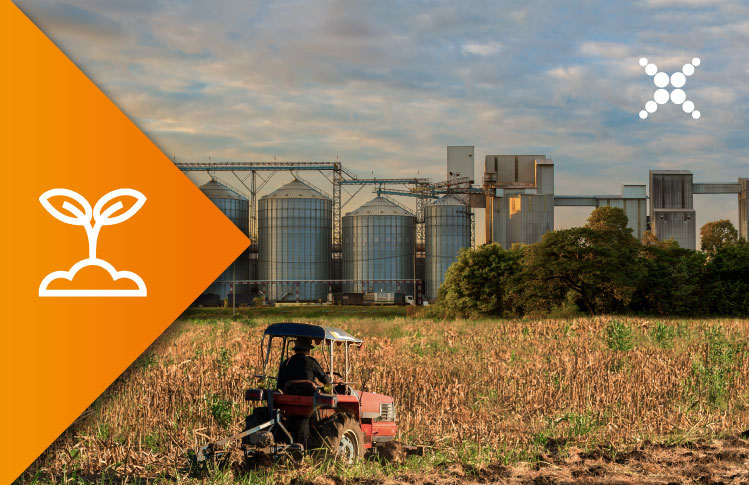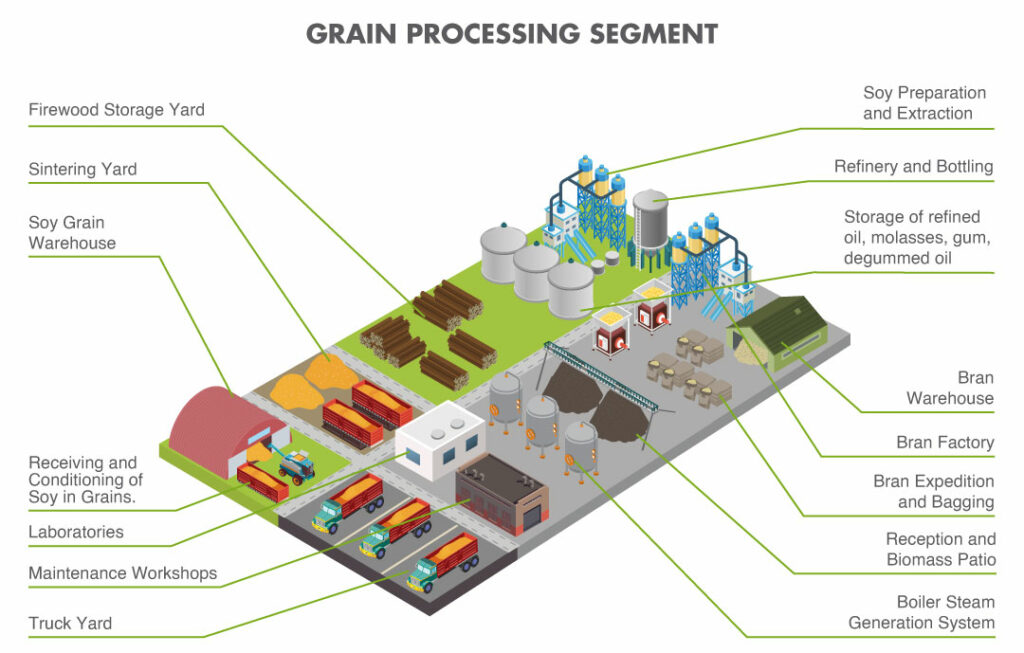
The term “breadbasket of the world” usually refers to regions or countries that are important producers and exporters of food to the world. There are several regions that are considered breadbaskets of the world, but we specifically want to talk about Brazil and Latin America. They are the main agricultural producers and exporters of these products.
We know that what is driving the agribusiness here are the possible solutions and partnerships so that sustainability can shine, which has been the protagonist in recent years.
Here are some numbers about agribusiness in Brazil and Latin America:
Given the presented data, we can have an idea of the positive impact that agribusiness could have as an ally of sustainability.
To delve a little deeper and understand the great process that involves agribusiness, we will see here its main sectors:
Agricultural production involves the cultivation of grains, fruits, vegetables, sugarcane, coffee, among other products.
Livestock is also an important activity, involving the breeding of cattle, pigs, poultry, among other animals for the production of meat, milk, eggs, and other animal products.
The transformation agribusiness involves the processing of agricultural products into processed foods, such as sugar, vegetable oils, flours, dairy derivatives, processed meats, among other products.
The agribusiness of biofuels is also an important activity in the region, involving the production of biofuels, such as ethanol and biodiesel, from agricultural raw materials, such as sugarcane and soybeans.
Agricultural inputs, such as fertilizers, pesticides, seeds, agricultural machinery and equipment, are also part of the agricultural production chain in Latin America, as they are essential for agricultural production.
Trade and logistics involve the commercialization and transportation of agricultural and agribusiness products.
Sustainability agribusiness is a growing and developing term in Latin America, aiming to reconcile agricultural and industrial production with environmental preservation and social development.
Agricultural production can contribute to the reduction of greenhouse gas emissions through practices such as direct planting, crop rotation, the use of organic fertilizers, and reducing food waste. In addition, the production of biofuels from renewable sources can also contribute to the reduction of greenhouse gas emissions in the transportation sector.
Given the complexity of the chain and the robustness of its numbers, the responsibility is equally shared when it comes to sustainability and environmental preservation.
The main characteristics of sustainability agribusiness are the use of cleaner technologies, waste reduction, efficient management of natural resources, preservation of biodiversity, valorization of local labor, among others.
In Latin America, there are several initiatives focused on sustainability agribusiness. One example is the Green Pacific Alliance program, which involves the countries of the Pacific Alliance (Mexico, Peru, Chile, and Colombia) and aims to promote economic and social development through sustainable practices in agribusiness.
Another example is the Conservation Agriculture program, which encourages the adoption of sustainable practices in agricultural production in countries such as Brazil, Argentina, and Paraguay. Among the encouraged practices are crop rotation, the use of direct planting techniques, the adoption of agroforestry systems, among others.
In addition, Latin America is also an important producer of organic and agroecological foods, which are produced without the use of pesticides and chemical fertilizers. These products have grown in popularity and demand, both in local and international markets.
In summary, sustainability agribusiness is a growing sector in Latin America and has shown to be a viable alternative to reconcile economic development with environmental preservation and social development.
In summary, the greenhouse effect has significant impacts on agricultural production, but there are also opportunities for agribusiness to contribute to reducing greenhouse gas emissions and adapting to climate change.
Agricultural production can be affected by global warming in several ways. One of the main effects is the change in rainfall patterns, which can lead to droughts or floods in areas that previously had a more regular climate. In addition, the increase in average temperature can favor the emergence of pests and diseases in crops, affecting productivity and the quality of food produced.
In addition to all the alternatives presented in sustainability agribusiness, one of the effective contributions that we cannot fail to mention is the exchange of conventional lighting for LED.
Ah, but you probably already know that! What may be a highlight of this article is that there are luminaires more suitable for the production process in agribusiness, which allows not only a reduction in energy consumption but also a reduction in replacement and maintenance. This means less waste in the environment and significant savings for the company.
Let’s look at the diagram below about the grain processing stages:

Each process has its peculiarities such as dust, steam, high temperatures, vibration, and explosive atmospheres, and the acquisition of appropriate lighting equipment for each area is extremely relevant to ensure a long service life and proper operation for many years without burning or replacement.
The largest agricultural producers use Conexled lighting. Check out some projects carried out in the agro-industry.
Energy efficiency: LED lamps consume significantly less energy than conventional lamps, which helps reduce operating costs.
Durability: LED lamps have a longer lifespan than conventional lamps, which helps reduce replacement costs.
Environmental sustainability: LED lamps contain no hazardous materials and are recyclable, reducing waste in the environment.
LED in Agro is efficient, sustainable and profitable!
CNPJ 54.601.612/0001-69
Conex Eletromecânica Ind e Com Ltda.
A Conexled procura constantemente novos fornecedores para seus negócios.
Se você tem interesse em ser um de nossos parceiros, preencha o formulário abaixo.
Quer ser um representante da Conexled?
Se você tem interesse em ser um parceiro da marca, preencha o formulário abaixo.
Ficou com alguma dúvida, ou precisa de ajuda para escolher a melhor solução para seu projeto?
Fale diretamente com um de nossos consultores.